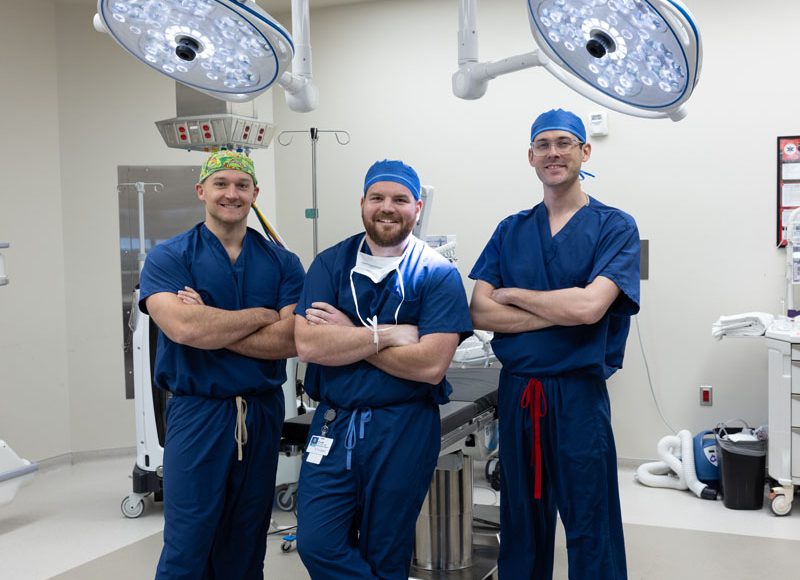Making Recovery Happen, No Matter the Injury
Knoxville Orthopaedic Clinic expands, bringing on new surgeons with unique expertise and strong connections to East Tennessee
Story by Micha Haas | Photography by Sam McGhee
For McMinn County Sheriff Joe Guy, getting back on the road after a mountain bike accident was a necessity, both professionally and personally. He had suffered a left AC separation (that is, the connection between the left shoulder blade and collarbone), a cracked radial head on his right elbow, and a right rib fracture.
“I was 55. I’m not the youngest guy in the world,” says Guy. “I really was concerned about getting healed back up.”
Thankfully, the solution came quickly. The day after the accident, Guy arrived at Knoxville Orthopaedic Clinic to meet shoulder and elbow expert, Dr. Kyle Achors. In just a few weeks, he received the surgery he needed to correct the AC injury and was on the path to recovery.
“The surgical experience was great. I had no problems,” says Guy. “The staff were wonderful and pleasant, and they provided all the information I needed for recovery.”
Now Guy is back to the gym and back on the road, with no signs of slowing down, thanks to the hard work and skill of Dr. Achors and the KOC team.
“When I do surgery, I want to make sure that I’m going to help somebody,” says Dr. Achors. “That’s the most important thing.”
Dr. Achors, who only recently joined the KOC family, got into this field for the challenge, he says, understanding how critical this part of the body is to basic quality of life.
“We rely on our upper extremities for so much of what we do in our lives, that when you have a shoulder problem, that can be especially cumbersome to the patient’s quality of life,” Dr. Achors says. “So just being able to help people improve in that way was really satisfying for me in my training.”
Dr. Achors brings with him the medical skill accumulated through years of training across the country, including under well-respected shoulder and elbow surgeons. From torn rotator cuffs and labral tears to fractures and arthritis, “I feel like I’m the surgeon who can take care of them,” he says.
But Dr. Achors is just one of multiple orthopaedic surgeons who have recently joined the KOC team. Each brings their own expertise and specialty to the table, adding to KOC’s already-formidable staff of surgeons.
Dr. Nicholas Yetter, for instance, is an expert in hand and wrist surgery, following in the footsteps of not only his anesthesiologist father and the many doctors he shadowed as a youth, but also his mentor, KOC’s Dr. Robert Ivy. Dr. Yetter works on common ailments such as carpal tunnel and trigger fingers. He also treats fractures and more complex issues in the upper extremities.
“A lot of things in the hands affect all age groups,” he says. “For example with trigger fingers, some people will wait a long time until their fingers are really stiff, and then it takes a bit longer to recover those parts.”
Dr. William Brooks specializes in sports medicine, inspired by his own experiences as a patient of KOC’s Dr. Paul Becker, after he tore both shoulders playing high school football. To him, being an orthopaedic surgeon is synonymous with being at KOC. He couldn’t imagine working elsewhere, and is excited to bring to others the same level of care he received.
“My passion is taking care of athletes,” says Dr. Brooks. In addition to his clinical work, he often volunteers to cover the sidelines at athletic events. “I like being hands-on in those experiences and being available. If somebody gets injured, I’m right there to help out.”
KOC has given all three of these doctors a chance to make an impact on the lives of their patients and a strong team to collaborate with.
“At KOC, you’re never alone,” says Dr. Yetter. “If I have a pediatric fracture I’m worried about or something like that, I have several partners that are always willing to help out.”
“Patients that come to KOC are going to be treated respectfully and appropriately,” says Dr. Achors. “And we’re going to help them have a good outcome regardless of what kind of treatment they need.”


Comments are closed.